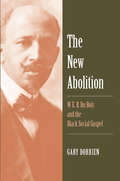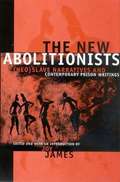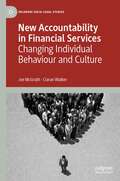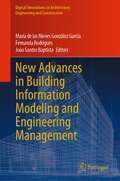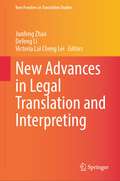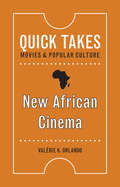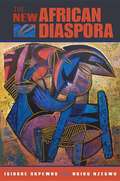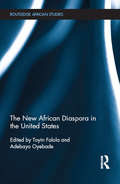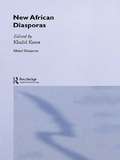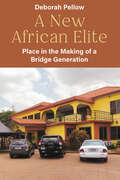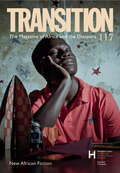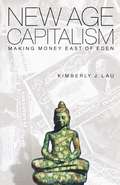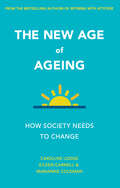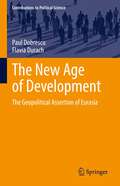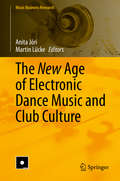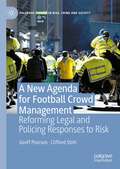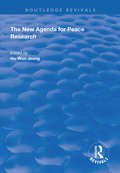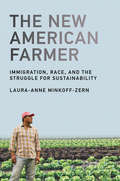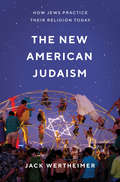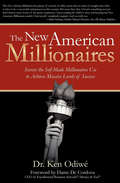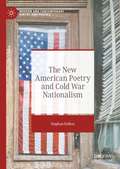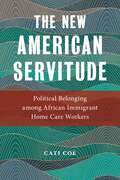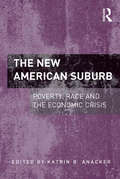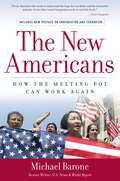- Table View
- List View
The New Abolition
by Gary DorrienThe black social gospel emerged from the trauma of Reconstruction to ask what a "new abolition" would require in American society. It became an important tradition of religious thought and resistance, helping to create an alternative public sphere of excluded voices and providing the intellectual underpinnings of the civil rights movement. This tradition has been seriously overlooked, despite its immense legacy. In this groundbreaking work, Gary Dorrien describes the early history of the black social gospel from its nineteenth-century founding to its close association in the twentieth century with W. E. B. Du Bois. He offers a new perspective on modern Christianity and the civil rights era by delineating the tradition of social justice theology and activism that led to Martin Luther King Jr. "
The New Abolitionists: (Neo)Slave Narratives and Contemporary Prison Writings (SUNY Series, Philosophy and Race)
by Joy JamesThis collection of essays and interviews provides a frank look at the nature and purposes of prisons in the United States from the perspective of the prisoners. Written by Native American, African American, Latino, Asian, and European American prisoners, the book examines captivity and democracy, the racial other, gender and violence, and the stigma of a suspect humanity.
New Accountability in Financial Services: Changing Individual Behaviour and Culture (Palgrave Socio-Legal Studies)
by Joe McGrath Ciaran WalkerThis book is a critical examination of recently introduced individual accountability regimes that apply to the financial services industry in the UK (SMCR) and Australia (BEAR and the forthcoming FAR), together with a forthcoming new individual accountability regime ( in particular, SEAR) in Ireland. It provides a framework for analysing whether these regimes will achieve behavioural change in the financial services industry. This book argues that, whilst sanctioning individuals to deter future misconduct is an important part of any successful regulatory strategy, the focus should be on ensuring that individuals in the financial services industry internalise the norms of behaviour expected under the new regimes. In this regard, the analysis in this book is informed by criminological theory, regulatory theory and behavioural science. The work also argues for a “trajectory towards professionalisation” of financial services, and banking in particular, as an important means of positively influencing industry-wide norms of behaviour, which have a key influence on firms’ and individuals’ behaviours.
New Advances in Building Information Modeling and Engineering Management (Digital Innovations in Architecture, Engineering and Construction)
by María de las Nieves González García Fernanda Rodrigues João Santos BaptistaThis book explores the latest advances in the field of building management. Several chapters use new technologies such as the BIM methodology for collecting life cycle information and managing the maintenance of existing buildings, sharing valid historical and architectural heritage data, energy analysis of building envelopes, and planning new buildings or sustainable building practices. In addition, other tools are presented that focus on improving access to BIM information, open-source governance, mobile applications to accelerate information transfer, the use of blockchain, lean design methods, and open-source software to solve critical path problems. Some contributions feature the assessment of occupational risks in construction, as it is necessary to plan preventive measures based on risk assessments integrated throughout the construction process, which is another important element for the management of this sector.
New Advances in Legal Translation and Interpreting (New Frontiers in Translation Studies)
by Junfeng Zhao Defeng Li Victoria Lai Cheng LeiThis book describes interdisciplinary exploration of matters related to the translation and interpreting of legal texts. Translation of legal texts has grown exponentially since the beginning of new millennium in response to the fast-increasing volume of international trade and business as well as all sorts of other transnational activities in a myriad of spheres. International trade demands translation of trade laws and business contracts, immigration leads to rise in court interpreting services, and countries may seek to enhance their international influence through translating and making known to the world their laws and/or other legal documents. These legal translation activities occurred mostly between languages officially used in international or regional organizations, such as the United Nations and the European Union, and between the languages of major countries who exert or seek influence on international economy and law. On the other hand, rapid advances in computer technology and artificial intelligence in recent years have also brought about changes in the practices of legal translation. With changes also come problems in both theory and practice that merit our immediate attention. This edited volume highlights the newest developments in the theory, practice, and training of legal translation, with contributions from international leading researchers in this area. It will be a standard reference for anyone who is to embark on research and practice of legal translation in the twenty-first century. It is also adaptable as teaching materials for translation and interpreting training.
New African Cinema
by Valérie K. OrlandoNew African Cinema examines the pressing social, cultural, economic, and historical issues explored by African filmmakers from the early post-colonial years into the new millennium. Offering an overview of the development of postcolonial African cinema since the 1960s, Valérie K. Orlando highlights the variations in content and themes that reflect the socio-cultural and political environments of filmmakers and the cultures they depict in their films. Orlando illuminates the diverse themes evident in the works of filmmakers such as Ousmane Sembène’s Ceddo (Senegal, 1977), Sarah Maldoror’s Sambizanga (Angola, 1972), Assia Djebar’s La Nouba des femmes de Mont Chenoua (The Circle of women of Mount Chenoua, Algeria, 1978), Zézé Gamboa’s The Hero (Angola, 2004) and Abderrahmane Sissako’s Timbuktu (Mauritania, 2014), among others. Orlando also considers the influence of major African film schools and their traditions, as well as European and American influences on the marketing and distribution of African film. For those familiar with the polemics of African film, or new to them, Orlando offers a cogent analytical approach that is engaging.
The New African Diaspora
by Isidore Okpewho Nkiru NzegwuThe New York Times reports that since 1990 more Africans have voluntarily relocated to the United States and Canada than had been forcibly brought here before the slave trade ended in 1807. The key reason for these migrations has been the collapse of social, political, economic, and educational structures in their home countries, which has driven Africans to seek security and self-realization in the West. This lively and timely collection of essays takes a look at the new immigrant experience. It traces the immigrants' progress from expatriation to arrival and covers the successes as well as problems they have encountered as they establish their lives in a new country. The contributors, most immigrants themselves, use their firsthand experiences to add clarity, honesty, and sensitivity to their discussions of the new African diaspora.
The New African Diaspora in the United States (Routledge African Studies)
by Toyin Falola Adebayo OyebadeFast growing in population, African immigrants in the United States have become a significant force, to the point that the idea of a new African diaspora is now a reality. This thriving community has opened new arenas of scholarly discourse on Black Atlantic history beyond the trans-Atlantic slave trade and its legacies. This book investigates the complex dynamic forces that have shaped, and continue to shape, this new diaspora. In eleven original essays, the volume examines pertinent themes, such as: immigration, integration dilemmas, identity construction, brain drain, remittances, expanding African religious space, and how these dynamics impact and intersect with the African homeland. With contributors from both sides of the Atlantic that represent a diverse range of academic disciplines, this book offers a broad perspective on emerging themes in contemporary African diasporan experiences. The book will be of interest to scholars and students of African and African-American Studies, Sociology, and History.
The New African Diaspora in Vancouver
by Gillian CreeseThe New African Diaspora in Vancouver documents the experiences of immigrants from countries in sub-Saharan Africa on Canada's west coast. Despite their individual national origins, many adopt new identities as 'African' and are actively engaged in creating a new, place-based 'African community.' In this study, Gillian Creese analyzes interviews with sixty-one women and men from twenty-one African countries to document the gendered and racialized processes of community-building that occur in the contexts of marginalization and exclusion as they exist in Vancouver.Creese reveals that the routine discounting of previous education by potential employers, the demeaning of African accents and bodies by society at large, cultural pressures to reshape gender relations and parenting practices, and the absence of extended families often contribute to downward mobility for immigrants. The New African Diaspora in Vancouver maps out how African immigrants negotiate these multiple dimensions of local exclusion while at the same time creating new spaces of belonging and emerging collective identity.
New African Diasporas (Global Diasporas)
by Khalid KoserThe extensive literature relating to the African diaspora has tended to concentrate on the descendants of those who left Africa as part of the slave trade to North America. This important new book gathers together work on more recent waves of African migration from some of the most exciting thinkers on the contemporary diaspora. Concentrating particularly on the last 20 years, the contributions look to the United States and beyond to diaspora settlement in the UK and Northern Europe. New African Diasporas looks at a range of different types of diaspora - legal and illegal, professional and low-skilled, asylum seekers and 'economic migrants' - and includes chapters on diasporic communities originating in Cote d'Ivoire, Democratic Republic of Congo, Eritrea, Ghana, Senegal and Somalia. It also examines often neglected differences based on gender, class and generation in the process. This book will be essential reading for anyone with an interest in the African diaspora and provides the most wide-ranging picture of the new African diaspora yet.
A New African Elite: Place in the Making of a Bridge Generation
by Deborah PellowFocusing on a sub-set of the Dagomba of northern Ghana, this book looks at the first generation to go through secondary school in the north. After university and post-graduate education, they relocate to Accra, the capital, hundreds of miles south. They crossed social and physical space and have become cosmopolitan while holding on to tradition and attachment to their home town. This bridge generation are patrons to those living up north. This book charts their path into elite status and argues that they use the tools gained through education and social connections to influence politics back home.
New African Fiction: The Magazine of Africa and the Diaspora (Transition #117)
by Indiana University JournalsPublished three times per year by Indiana University Press for the Hutchins Center at Harvard University, Transition is a unique forum for the freshest, most compelling ideas from and about the black world. Since its founding in Uganda in 1961, the magazine has kept apace of the rapid transformation of the African Diaspora and has remained a leading forum of intellectual debate. In issue 117, Transition presents new short fiction from writers with Uganda, Nigeria, Senegal, Ghana, Liberia--and the diaspora--in their veins. Also in this issue are: selections from Transition's online forum, "I Can't Breathe," a venue for discussing the recent murders by police of unarmed black Americans; selections of poetry; and an interview with the architect and curator of the opening exhibit at Harvard University's new Cooper Gallery of African and African American Art.
New Age Capitalism
by Kimberly J. LauThe pursuit of health and wellness has become a fundamental and familiar part of everyday life in America. We are surrounded by an enticing world of products, practices, and promotions assuring health and happiness--cereal boxes claim that their contents can reduce the risk of heart disease, bars of aromatherapy soap seek to wash away our stresses, newspapers celebrate the wonders of the latest superfoods and herbal remedies. No longer confined to the domain of Western medicine, suggestions for healthy living often turn to alternatives originating in distant times and places, in cultures very different from our own. Diets from ancient or remote groups are presented as cures for everything from colds to cancer; exercise regimens based on Eastern philosophies are heralded as paths to physical health and spiritual wellbeing.In New Age Capitalism, Kimberly Lau examines the ideological work that has created this billion-dollar business and allowed "Eastern" and other non-Western traditions to be coopted by Western capitalism. Extending the orientalist logic to the business of health and wellness, American companies have created a lucrative and competitive market for their products, encouraging consumers to believe that they are making the right choices for personal as well as planetary health. In reality, alternative health practices have been commodified for an American public longing not only for health and wellness but also for authenticity, tradition, and a connection to the cultures of an imagined Edenic past. Although consumers might prefer to buy into "authentic" non-Western therapies, New Age Capitalism argues that the market economy makes this goal unattainable.
The New Age of Ageing: How Society Needs to Change
by Caroline Lodge Eileen CarnellAs we age, society’s negative assumptions mean we become a burden, a problem and the excluded ‘other’. With a convincing call to embrace all that is positive about ageing comes this timely book from the authors of Retiring with Attitude. Debunking the myth of the ageing time bomb it presents a new, yet realistic, way for society to engage with older people from a myriad of perspectives, including consumerism, media, work, housing, community and 'beauty'. Brought alive by the voices of people aged 50 to 90, it proves ageing is not passive decline but a process of learning, joy, political engagement, challenges and achievement. Increased longevity has consequences for us all. By challenging our assumptions and stereotypes, this book demonstrates that we are capable of living better together longer in this new, older world.
The New Age of Development: The Geopolitical Assertion of Eurasia (Contributions to Political Science)
by Paul Dobrescu Flavia DurachThis book focuses on current trends in development, arguing that the digital revolution will shape today’s race for global supremacy. The volume explores how the technological race, driven by AI advances, will decisively contribute to shaping a new world order. Every leap in technological advancement changes the rules of the game and initiate new cycles of economic growth. The main argument of the authors is that these changes are particularly intense in Eurasia, the main geopolitical hotspot at the moment. Starting from recent statistical data, the authors underline this new ascent of the Asian continent - a shift that can be best described as a historical change of relay not between two countries, but between two continents. Lastly, the volume discusses the consequences of these shifts in power and influence, by reflecting on the possible new world order to follow. Effectively providing an overview of the challenges that will decisively shape future geopolitical relations, this volume will be of use to researchers and students interested in globalization studies, international relations, geopolitics, and development.
The New Age of Electronic Dance Music and Club Culture (Music Business Research)
by Martin Lücke Anita JóriThis book offers a comprehensive overview of electronic dance music (EDM) and club culture. To do so, it interlinks a broad range of disciplines, revealing their (at times vastly) differing standpoints on the same subject. Scholars from such diverse fields as cultural studies, economics, linguistics, media studies, musicology, philosophy, and sociology share their perspectives. In addition, the book features articles by practitioners who have been active on the EDM scene for many years and discuss issues like gender and diversity problems in general, and the effects of gentrification on club culture in Berlin. Although the book’s main focus is on Berlin, one of the key centers of EDM and club culture, its findings can also be applied to other hotspots. Though primarily intended for researchers and students, the book will benefit all readers interested in obtaining an interdisciplinary overview of research on electronic dance music.
A New Agenda For Football Crowd Management: Reforming Legal and Policing Responses to Risk (Palgrave Studies in Risk, Crime and Society)
by Geoff Pearson Clifford StottThis book provides a holistic and interdisciplinary focus on the legal regulation and policing of football violence and disorder in Britain. Anchored in ground-breaking ethnographic and participant-action research, the book combines a crowd psychology and socio-legal approach to critically explore the contemporary challenges of managing football crowds. It sets out the processes by which football disorder occurs and the limitations of existing approaches to policing ‘football hooliganism’, in particular the dominant focus on controlling ‘risk supporters’, before setting out proposals for fundamental reforms to both law and policing. This book will be of value to academics, students, legal and policing practitioners, as well as policy-makers. The two authors are internationally known experts in the management and behaviour of football crowds and bring together for the first time over 30 years of research in this area from the disciplines of law and social psychology.
The New Agenda for Peace Research (Routledge Revivals)
by Hon-Won JeongFirst published in 1999, this volume analyses the conditions related not only to physical violence, but also to domination sustained by cultural norms, development practice and environmental policies. Peace research can be established as an integrative project by developing a conceptually coherent map which helps to reveal the locations and sources of violence, examine strategies to deal with them and illuminate structural transitions to a non-hierarchical world order. The themes in various chapters of this book can be submerged under the disciplinary goal of peace research which links the management and prevention of violent conflicts to non-violent structural transformations.
The New American Farmer: Immigration, Race, and the Struggle for Sustainability (Food, Health, and the Environment)
by Laura-Anne Minkoff-ZernAn examination of Latino/a immigrant farmers as they transition from farmworkers to farm owners that offers a new perspective on racial inequity and sustainable farming.Although the majority of farms in the United States have US-born owners who identify as white, a growing number of new farmers are immigrants, many of them from Mexico, who originally came to the United States looking for work in agriculture. In The New American Farmer, Laura-Anne Minkoff-Zern explores the experiences of Latino/a immigrant farmers as they transition from farmworkers to farm owners, offering a new perspective on racial inequity and sustainable farming. She finds that many of these new farmers rely on farming practices from their home countries—including growing multiple crops simultaneously, using integrated pest management, maintaining small-scale production, and employing family labor—most of which are considered alternative farming techniques in the United States.Drawing on extensive interviews with farmers and organizers, Minkoff-Zern describes the social, economic, and political barriers immigrant farmers must overcome, from navigating USDA bureaucracy to racialized exclusion from opportunities. She discusses, among other topics, the history of discrimination against farm laborers in the United States; the invisibility of Latino/a farmers to government and universities; new farmers' sense of agrarian and racial identity; and the future of the agrarian class system.Minkoff-Zern argues that immigrant farmers, with their knowledge and experience of alternative farming practices, are—despite a range of challenges—actively and substantially contributing to the movement for an ecological and sustainable food system. Scholars and food activists should take notice.
The New American Judaism: How Jews Practice Their Religion Today
by Jack WertheimerA leading expert provides an engaging firsthand portrait of American Judaism todayAmerican Judaism has been buffeted by massive social upheavals in recent decades. Like other religions in the United States, it has witnessed a decline in the number of participants over the past forty years, and many who remain active struggle to reconcile their hallowed traditions with new perspectives—from feminism and the LGBTQ movement to “do-it-yourself religion” and personally defined spirituality. Taking a fresh look at American Judaism today, Jack Wertheimer, a leading authority on the subject, sets out to discover how Jews of various orientations practice their religion in this radically altered landscape. Which observances still resonate, and which ones have been given new meaning? What options are available for seekers or those dissatisfied with conventional forms of Judaism? And how are synagogues responding?Wertheimer provides new and often-surprising answers to these questions by drawing on a wide range of sources, including survey data, visits to countless synagogues, and revealing interviews with more than two hundred rabbis and other informed observers. He finds that the majority of American Jews still identify with their faith but often practice it on their own terms. Meanwhile, gender barriers are loosening within religiously traditional communities, while some of the most progressive sectors are reappropriating long-discarded practices. Other recent developments include “start-ups” led by charismatic young rabbis, the explosive growth of Orthodox “outreach,” and unconventional worship experiences often geared toward millennials.Wertheimer captures the remarkable, if at times jarring, tableaux on display when American Jews practice their religion, while also revealing possibilities for significant renewal in American Judaism. What emerges is a quintessentially American story of rash disruption and creative reinvention, religious illiteracy and dynamic experimentation.
The New American Millionaires: Secrets the Self-Made Millionaires Use to Achieve Massive Levels of Success
by Dr. Ken OdiwéLessons from immigrants who have prospered against the odds: &“Marvelous.&” —John Harricharan, author of When You Can Walk on Water, Take the Boat Over decades and centuries, people have come to the United States—often fleeing desperate circumstances, with next to nothing in their pockets and not even speaking the language. Yet many find extraordinary success in America, some even within a single generation of their arrival. The New American Millionaires focuses on a number of high profile immigrant millionaires living and working in the United States. Through their stories—and his own—Dr. Ken Odiwé reveals the specific qualities and attributes of the new American millionaire. These qualities and attributes are then broken down into a series of action steps that any entrepreneur can take to embark on a path of similar success. Supported by nearly a decade of research and interviews with new American millionaires, this is a guide that can inspire and inform anyone who wants to tap into their own sense of courage and adventure.
The New American Poetry and Cold War Nationalism (Modern and Contemporary Poetry and Poetics)
by Stephan DelbosThis book examines Donald M. Allen’s crucially influential poetry anthology The New American Poetry, 1945–1960 from the perspectives of American Cold War nationalism and literary transnationalism, considering how the anthology expresses and challenges Cold War norms, claiming post-war Anglophone poetic innovation for the United States and reflecting the conservative American society of the 1950s. Examining the crossroads of politics, social life, and literature during the Cold War, this book puts Allen’s anthology into its historical context and reveals how the editor was influenced by the volatile climate of nationalism and politics that pervaded every aspect of American life during the Cold War. Reconsidering the dramatic influence that Allen’s anthology has had on the way we think about and anthologize American poetry, and recontextualizing The New American Poetry as a document of the Cold War, this study not only helps us come to a more accurate understanding of how the anthology came into being, but also encourages new ways of thinking about all of Anglophone poetry, from the twentieth century and today.
The New American Servitude: Political Belonging among African Immigrant Home Care Workers (Anthropologies of American Medicine: Culture, Power, and Practice #3)
by Cati CoeFinalist, 2020 Elliott P. Skinner Award, given by the Association of Africanist AnthropologyExamines why African care workers feel politically excluded from the United States Care for America’s growing elderly population is increasingly provided by migrants, and the demand for health care labor is only expected to grow. Because of this health care crunch and the low barriers to entry, new African immigrants have adopted elder care as a niche employment sector, funneling their friends and relatives into this occupation. However, elder care puts care workers into racialized, gendered, and age hierarchies, making it difficult for them to achieve social and economic mobility. In The New American Servitude, Coe demonstrates how these workers often struggle to find a sense of political and social belonging. They are regularly subjected to racial insults and demonstrations of power—and effectively turned into servants—at the hands of other members of the care worker network, including clients and their relatives, agency staff, and even other care workers. Low pay, a lack of benefits, and a lack of stable employment, combined with a lack of appreciation for their efforts, often alienate them, so that many come to believe that they cannot lead valuable lives in the United States. While jobs are a means of acculturating new immigrants, African care workers don’t tend to become involved or politically active. Many plan to leave rather than putting down roots in the US. Offering revealing insights into the dark side of a burgeoning economy, The New American Servitude carries serious implications for the future of labor and justice in the care work industry.
The New American Suburb: Poverty, Race and the Economic Crisis
by Katrin B. AnackerThe majority of Americans live in suburbs and until about a decade or so ago, most suburbs had been assumed to be non-Hispanic White, affluent, and without problems. However, recent data have shown that there are changing trends among U.S. suburbs. This book provides timely analyses of current suburban issues by utilizing recently published data from the 2010 Census and American Community Survey to address key themes including suburban poverty; racial and ethnic change and suburban decline; suburban foreclosures; and suburban policy.
The New Americans: How the Melting Pot Can Work Again
by Michael BaroneSometime in this century, we are told, the United States will become a "majority-minority" country--that is, a nation where whites make up less than 50 percent of the population. Many believe this signals a fundamental change in America. Does it? Is the Melting Pot a thing of the past?Absolutely not, says political historian Michael Barone. In The New Americans, Barone reminds us that the United States has never been a homogeneous, monoethnic nation. He reveals how the new Americans of today can be interwoven into the fabric of American life just as immigrants have been interwoven throughout U.S. history.If we heed the lessons of America's past--and avoid misguided policies and programs that hinder rather than help assimilation--the Melting Pot can work as well today as it always has.
